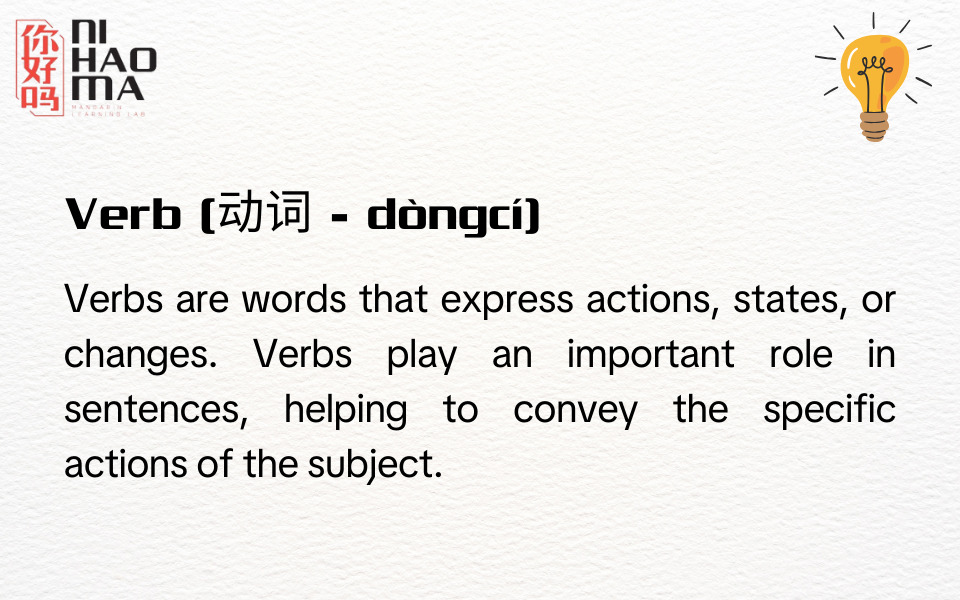Verbs are essential for expressing ideas clearly and fluently. In this guide, Ni Hao Ma has compiled 100+ common Chinese verbs, along with key classifications, explanations, and important usage notes to help you remember and apply them effortlessly in real-life conversations.
What Are Chinese Verbs?
A verb (动词 – dòngcí) is a word that describes an action, state, or change. Verbs play a crucial role in sentences, helping to convey specific actions performed by the subject.

The usage and combination of Chinese verbs are highly flexible. Verbs can be paired with adverbs, complements, and prepositions to form verb phrases that add precision and clarity to a sentence.
Types of Chinese Verbs
In Chinese, verbs are categorized based on their function and usage. Below are the most common types:
1. Action Verbs (动作动词)
Action verbs describe specific actions performed by a person or object. They are the most commonly used Chinese verbs and often pair with objects to form complete sentences.
| Chinese Verbs | Examples |
|---|---|
| 吃 (chī) – to eat | 我每天吃苹果。 (Wǒ měitiān chī píngguǒ.) (I eat apples every day.) |
| 跑 (pǎo) – to run | 他跑得很快。 (Tā pǎo de hěn kuài.) (He runs very fast.) |
| 跳 (tiào) – to jump, to dance | 他们在公园跳舞。 (Tāmen zài gōngyuán tiàowǔ.) (They are dancing in the park.) |
| 读 (dú) – to read | 她喜欢读书。 (Tā xǐhuān dú shū.) (She likes reading books.) |
| 开 (kāi) – to open/turn on | 请开门! (Qǐng kāi mén!) (Please open the door!) |
| 走 (zǒu) – to walk | 我走回家了。 (Wǒ zǒu huí jiā le.) (I walked home.) |
2. Psychological Verbs (心理动词)
Psychological verbs in Chinese describe emotions, thoughts, and attitudes. These verbs often take an object that represents the affected entity and are frequently used with adverbs like 很 (hěn – very), 非常 (fēicháng – extremely), and 真的 (zhēnde – truly).
| Chinese Verbs | Examples |
|---|---|
| 爱 (ài) – to love | 我爱你。 (Wǒ ài nǐ.) (I love you.) |
| 喜欢 (xǐhuān) – to like | 她喜欢看电影。 (Tā xǐhuān kàn diànyǐng.) (She likes watching movies.) |
| 想 (xiǎng) – to want/miss | 我想去旅行。 (Wǒ xiǎng qù lǚxíng.) (I want to travel.) |
| 希望 (xīwàng) – to hope | 我希望明天能下雪。 (Wǒ xīwàng míngtiān néng xiàxuě.) (I hope it snows tomorrow.) |
| 讨厌 (tǎoyàn) – to hate | 我讨厌早起。 (Wǒ tǎoyàn zǎo qǐ.) (I hate waking up early.) |

3. Modal Verbs in Chinese
Modal verbs (能愿动词) are a special type of Chinese verbs used to express ability, permission, will, desire, or necessity. They typically appear before the main verb in a sentence to modify its meaning.
| Chinese Verbs | Examples |
|---|---|
| 能 (néng): can, be able to | 我能说汉语。 (Wǒ néng shuō hànyǔ) I can speak Chinese. |
| 会 (huì): know how to, can (due to learning or practice) | 他会游泳。 (Tā huì yóuyǒng) He can swim. |
| 可以 (kěyǐ): can, be allowed to | 你可以去玩。 (Nǐ kěyǐ qù wán) You can go play. |
| 让 (ràng): allow, let | 老师让我出去。 (Lǎoshī ràng wǒ chūqù) The teacher allowed me to go out. |
| 要 (yào): want, need | 我想要去旅行。 (Wǒ xiǎng yào qù lǚxíng) I want to travel. |
| 必须 (bìxū): must, have to | 我们必须提前准备。 (Wǒmen bìxū tíqián zhǔnbèi) We must prepare in advance. |
| 应该 (yīnggāi): should | 你应该吃得更健康。 (Nǐ yīnggāi chī de gèng jiànkāng.) You should eat healthier. |
4. Separable Verbs in Chinese
Separable verbs (离合动词) are a unique type of Chinese verbs that consist of two components: a verb and a complement. These components can be split in a sentence, allowing other elements to be inserted between them.
| Chinese Verbs | Examples |
|---|---|
| 吃饭 (chī fàn): to eat a meal | 我吃了饭。 (Wǒ chī le fàn.) I have eaten. |
| 唱歌 (chàng gē): to sing | 大家都喜欢唱歌。 (Dàjiā dōu xǐhuān chàng gē.) Everyone likes singing. |
| 睡觉 (shuì jiào): to sleep | 她昨天晚上我睡觉很晚。 (Zuótiān wǎnshàng wǒ shuì jiào hěn wǎn.) I went to bed very late last night. |
| 看书 (kàn shū): to read a book | 我今天下午看了书。 (Wǒ jīntiān xiàwǔ kàn le shū.) I read a book this afternoon. |
| 开门 (kāi mén): to open the door | 我没开门。 (Wǒ méi kāi mén.) I didn’t open the door. |
5. Directional Verbs in Chinese
Directional verbs (趋向动词) are a type of Chinese verbs that indicate the direction or movement of an action. These verbs usually appear after the main verb in a sentence to provide additional directional meaning.
| Chinese Verbs | Examples |
|---|---|
| 来 (lái): to come (toward the speaker) | 他今天下午要来我家。 (Tā jīntiān xiàwǔ yào lái wǒ jiā) He is coming to my house this afternoon. |
| 去 (qù): to go (away from the speaker) | 我明天去北京出差。 (Wǒ míngtiān qù Běijīng chūchāi) I am going to Beijing for a business trip tomorrow. |
| 上 (shàng): to go up | 她上楼找书。 (Tā shàng lóu zhǎo shū) She went upstairs to find a book. |
| 下 (xià): to go down | 我们下车去吃饭。 (Wǒmen xià chē qù chīfàn) We got off the car to eat. |
| 进 (jìn): to enter | 他进了房间。 (Tā jìn le fángjiān.) He entered the room. |
| 出 (chū): to exit | 小猫从盒子里跳出来。 (Xiǎo māo cóng hézi lǐ tiào chūlái.) The kitten jumped out of the box. |

6. Perception Verbs
Perception verbs (感知动词) are verbs that express sensations, awareness, or understanding through the senses, such as hearing, seeing, feeling, detecting, and knowing. They are often followed by an object or a subject-predicate clause as an object.
| Chinese Verbs | Examples |
|---|---|
| 认为 (rènwéi): to think; to believe | 我认为这本书很好。 (Wǒ rènwéi zhè běn shū hěn hǎo.) I think this book is very good. |
| 发现 (fāxiàn): to discover; to notice; to realize | 我发现他不在家。 (Wǒ fāxiàn tā bú zài jiā.) I found out that he is not at home. |
| 知道 (zhīdào): to know; to be aware of | 我不知道他的名字。 (Wǒ bù zhīdào tā de míngzì.) I don’t know his name. |
| 记得 (jìdé): to remember | 你记得他的生日吗? (Nǐ jìdé tā de shēngrì ma?) Do you remember his birthday? |
| 忘记 (wàngjì): to forget | 我忘记带钥匙了。 (Wǒ wàngjì dài yàoshi le.) I forgot to bring my keys. |
7. Existential Verbs
Existential verbs (存现动词) are a special type of Chinese verbs used to describe the existence, appearance, or disappearance of a person or object.
| Chinese Verbs | Examples |
|---|---|
| 消失 (xiāoshī): to vanish; to disappear | 太阳下山后,光慢慢消失了。 (Tàiyáng xiàshān hòu, guāng mànmàn xiāoshī le.) After the sun set, the light gradually disappeared. |
| 有 (yǒu): to have; to exist | 商店里有很多人。 (Shāngdiàn lǐ yǒu hěn duō rén.) There are many people in the store. |
| 出现 (chūxiàn): to appear; to emerge | 我在街上突然出现了一个熟人。 (Wǒ zài jiē shàng túrán chūxiàn le yí gè shúrén.) A familiar person suddenly appeared on the street. |
| 存在 (cúnzài): to exist | 这种现象在世界上普遍存在。 (Zhè zhǒng xiànxiàng zài shìjiè shàng pǔbiàn cúnzài) This phenomenon exists widely in the world. |
| 发生 (fāshēng): to happen; to occur | 意外发生在我们离开之前。 (Yìwài fāshēng zài wǒmen líkāi zhīqián) The accident happened before we left. |

How to Use Chinese Verbs Naturally in Sentences
Chinese verbs play a crucial role in sentence construction, expressing actions, states, or changes in a subject. Their usage follows specific rules regarding position and function within a sentence.
1. Acting as the Predicate
The predicate is a key part of a sentence, usually indicating an action, state, or change of the subject. In Chinese, verbs commonly function as predicates, describing what the subject does or experiences.
Example:
我吃苹果。(Wǒ chī píngguǒ.) – I eat an apple.
→ 吃 (chī) is the verb acting as the predicate, describing the action of the subject 我 (wǒ).
2. Functioning as the Subject
Although less common, Chinese verbs can also serve as subjects in certain sentence structures. Normally, nouns or pronouns take the subject position, but in specific cases, verbs can be used this way.
Example:
跑步对健康有益。(Pǎobù duì jiànkāng yǒuyì.) – Running is beneficial to health.
→ 跑步 (pǎobù) is a verb, but in this sentence, it functions as the subject.

3. Acting as an Adverbial (Modifier)
Chinese verbs can sometimes function as adverbials, especially when combined with words indicating time, manner, or place to provide additional information about an action.
Examples:
我高兴地笑了。(Wǒ gāoxìng de xiào le) – I laughed happily.
→ 高兴地 (gāoxìng de) is an adverbial phrase describing how the subject 我 (wǒ) laughed.
他在公园跑步。(Tā zài gōngyuán pǎobù) – He runs in the park.
→ 在公园 (zài gōngyuán) is an adverbial phrase indicating the location of the action 跑步 (pǎobù).
4. Verbs with Complements
In Chinese, verbs often appear with complements that provide extra details about an action, such as its result, manner, or degree. These complements follow the verb and help clarify its meaning within the sentence.
Time Complements
Time complements describe when an action happens, helping to clearly determine whether an action has taken place or will take place.
Example:
我每天跑步。 (Wǒ měitiān pǎobù.) – I jog every day.
→ 每天 (měitiān) is a time complement, indicating that the action happens daily.
Result Complements
Result complements describe the outcome of an action expressed by the verb.
Example:
我吃完了晚饭。 (Wǒ chī wán le wǎnfàn.) – I have finished eating dinner.
→ 完 (wán) is a result complement, showing that the action of eating is completed.
Manner Complements
Manner complements describe how an action is performed.
Example:
他慢慢地走。 (Tā màn màn de zǒu.) – He walks slowly.
→ 慢慢地 (màn màn de) is a manner complement, describing the way the action is performed.
Degree Complements
Degree complements express the intensity or extent of an action or state.
Example:
我非常喜欢这本书。 (Wǒ fēicháng xǐhuān zhè běn shū.) – I really like this book.
→ 非常 (fēicháng) is a degree complement, placed before the verb 喜欢 (xǐhuān) to indicate a strong level of liking.
100+ Common Chinese Verbs
To help expand your vocabulary in Chinese conversations, here are 100+ common Chinese verbs that you can use to express your thoughts and intentions more easily:
| No. | Chinese Verb | Meaning |
|---|---|---|
| 1 | 走 (zǒu) | To walk |
| 2 | 看 (kàn) | To look, to watch |
| 3 | 听 (tīng) | To listen |
| 4 | 说 (shuō) | To speak, to say |
| 5 | 写 (xiě) | To write |
| 6 | 吃 (chī) | To eat |
| 7 | 喝 (hē) | To drink |
| 8 | 学 (xué) | To learn |
| 9 | 读 (dú) | To read |
| 10 | 做 (zuò) | To do, to make |
| 11 | 闹 (nào) | To make noise |
| 12 | 打 (dǎ) | To hit, to play (sports) |
| 13 | 扫 (sǎo) | To sweep |
| 14 | 给 (gěi) | To give |
| 15 | 带 (dài) | To bring, to take |
| 16 | 觉得 (juéde) | To feel |
| 17 | 喜欢 (xǐhuān) | To like |
| 18 | 讨厌 (tǎoyàn) | To dislike |
| 19 | 爱 (ài) | To love |
| 20 | 恨 (hèn) | To hate |
| 21 | 怕 (pà) | To be afraid |
| 22 | 发现 (fāxiàn) | To discover |
| 23 | 等 (děng) | To wait |
| 24 | 走 (zǒu) | To go (repeat) |
| 25 | 睡觉 (shuìjiào) | To sleep |
| 26 | 起床 (qǐchuáng) | To get up |
| 27 | 站 (zhàn) | To stand |
| 28 | 坐 (zuò) | To sit |
| 29 | 坏 (huài) | To break, to spoil |
| 30 | 搬 (bān) | To move |
| 31 | 带 (dài) | To bring, to lead (repeat) |
| 32 | 等 (děng) | To wait (repeat) |
| 33 | 叫 (jiào) | To call, to shout |
| 34 | 跑 (pǎo) | To run |
| 35 | 跳 (tiào) | To jump |
| 36 | 帮 (bāng) | To help |
| 37 | 记 (jì) | To remember |
| 38 | 换 (huàn) | To change |
| 39 | 扔 (rēng) | To throw |
| 40 | 拿 (ná) | To take, to hold |
| 41 | 捡 (jiǎn) | To pick up |
| 42 | 能 (néng) | Can, able to |
| 43 | 飞 (fēi) | To fly |
| 44 | 开 (kāi) | To open |
| 45 | 关 (guān) | To close |
| 46 | 出去 (chūqù) | To go out |
| 47 | 进来 (jìnlái) | To come in |
| 48 | 离开 (líkāi) | To leave |
| 49 | 问 (wèn) | To ask |
| 50 | 画 (huà) | To draw |
| 51 | 爬 (pá) | To climb |
| 52 | 切 (qiē) | To cut |
| 53 | 拿 (ná) | To take, to hold (repeat) |
| 54 | 放 (fàng) | To place, to release |
| 55 | 见 (jiàn) | To meet |
| 56 | 懂 (dǒng) | To understand |
| 57 | 尝 (cháng) | To taste |
| 58 | 掉 (diào) | To fall |
| 59 | 抱 (bào) | To hug |
| 60 | 用 (yòng) | To use |
| 61 | 需要 (xūyào) | To need |
| 62 | 亲 (qīn) | To kiss |
| 63 | 回答 (huídá) | To answer |
| 64 | 买 (mǎi) | To buy |
| 65 | 卖 (mài) | To sell |
| 66 | 找 (zhǎo) | To search, to find |
| 67 | 拉 (lā) | To pull |
| 68 | 推 (tuī) | To push |
| 69 | 送 (sòng) | To send, to gift |
| 70 | 猜 (cāi) | To guess |
| 71 | 熄 (xī) | To extinguish |
| 72 | 认为 (rènwéi) | To think, to believe |
| 73 | 骗 (piàn) | To deceive |
| 74 | 教 (jiāo) | To teach |
| 75 | 饿 (è) | Hungry |
| 76 | 发 (fā) | To send, to issue |
| 77 | 试 (shì) | To try |
| 78 | 想 (xiǎng) | To think, to want |
| 79 | 感觉 (gǎnjué) | To feel |
| 80 | 笑 (xiào) | To laugh |
| 81 | 哭 (kū) | To cry |
| 82 | 刷 (shuā) | To brush (teeth) |
| 83 | 担心 (dānxīn) | To worry |
| 84 | 知道 (zhīdào) | To know |
| 85 | 说明 (shuōmíng) | To explain |
| 86 | 同意 (tóngyì) | To agree |
| 87 | 反对 (fǎnduì) | To oppose |
| 88 | 结束 (jiéshù) | To finish |
| 89 | 开始 (kāishǐ) | To begin |
| 90 | 明白 (míngbai) | To understand clearly |
| 91 | 观察 (guānchá) | To observe |
| 92 | 认识 (rènshi) | To know (a person) |
| 93 | 握手 (wòshǒu) | To shake hands |
| 94 | 讨论 (tǎolùn) | To discuss |
| 95 | 相信 (xiāngxìn) | To believe |
| 96 | 担任 (dānrèn) | To take on (a role) |
| 97 | 期待 (qīdài) | To look forward to |
| 98 | 相遇 (xiāngyù) | To meet |
| 99 | 关心 (guānxīn) | To care about |
| 100 | 研究 (yánjiū) | To research |
| 101 | 旅行 (lǚxíng) | To travel |
| 102 | 误会 (wùhuì) | To misunderstand |
| 103 | 交流 (jiāoliú) | To communicate |
| 104 | 证明 (zhèngmíng) | To prove |
| 105 | 了解 (liǎojiě) | To understand |
| 106 | 练习 (liànxí) | To practice |
| 107 | 改变 (gǎibiàn) | To change |
| 108 | 介绍 (jièshào) | To introduce |
| 109 | 回答 (huídá) | To answer (repeat) |
| 110 | 参加 (cānjiā) | To participate |
Important Notes When Using Verbs in Chinese
Verbs are crucial elements in a sentence, helping to express actions, states, or relationships between objects in Chinese. However, not all verbs can be used interchangeably. Here are some important points to keep in mind to avoid common mistakes in expression:
Distinguishing Between Transitive and Intransitive Verbs
Some Chinese verbs can take a direct object (及物动词, jíwù dòngcí), while others cannot (不及物动词, bù jíwù dòngcí).
If a verb answers the question “what?” and has an object receiving the action, it is a transitive verb. If the verb only describes the method, state, or condition of an action without an object being affected, it is an intransitive verb.
For example:
- 我开门. (Wǒ kāi mén) – I open the door.
→ (开 is a transitive verb, and 门, mén, is the object.) - 我想睡觉. (Wǒ xiǎng shuìjiào) – I want to sleep.
→ (睡 shuìjiào, is an intransitive verb with no object.)
Repetition of Chinese Verbs
Repeating verbs in Chinese helps convey different nuances, such as softening the intensity, expressing conciseness, trial actions, or emphasizing. Here are some forms of verb repetition and their meanings:
| Forms of verb repetition | When to Use | Examples |
|---|---|---|
| Lặp lại động từ đơn âm tiết (A → AA) | This form emphasizes an action happening briefly, gently, or with a sense of trial. | 你看 → 你看看。 (Nǐ kàn → Nǐ kànkan.) → Take a look, please. 等 → 等等我。 (Děng → Děngděng wǒ.) → Wait for me a moment. |
| Two-Syllable Verb Repetition (AB → ABAB) | This form expresses a gentle or familiar tone, reducing the seriousness of the action. | 休息 → 休息休息。 (Xiūxí → Xiūxixiūxi.) → Take a short break. 商量 → 商量商量。 (Shāngliáng → Shāngliángshāngliáng.) → Let’s discuss a bit. |
| Single-Syllable Verb Repetition with 一 (A + 一 (yī) + A) | This form expresses an action being done gently or casually. | 看一看 (kàn yī kàn) Take a quick look. 想一想 (xiǎng yī xiǎng) Think about it for a moment. |

However, not all Chinese verbs can be repeated. Some groups of verbs cannot be repeated, including:
- Modal verbs: 能 (néng), 会 (huì), 可以 (kěyǐ), 该 (gāi), 应该 (yīnggāi), 必须 (bìxū), 敢 (gǎn), 肯 (kěn), 需要 (xūyào), …
- Relational verbs: 是 (shì – is), 像 (xiàng – like), 属于 (shǔyú – belong to), 叫 (jiào – call), 成为 (chéngwéi – become), 等于 (děngyú – equal), 似乎 (sìhū – seems), …
- Existential verbs: 在 (zài – at), 有 (yǒu – have), 发生 (fāshēng – happen), 出现 (chūxiàn – appear), 具有 (jùyǒu – have, possess), 存在 (cúnzài – exist), …
- Verbs expressing actions that happen only once or have a clear result: 失败 (shībài – fail), 毕业 (bìyè – graduate), 死 (sǐ – die), 消失 (xiāoshī – disappear), …
The verb 是 (shì)
Shì (是) is not a typical verb, but rather a special verb used for linking or identification. This verb does not express an action but simply identifies the state or nature of something.
For example:
- 他是学生。(Tā shì xuéshēng) – He is a student.
- 这是我的书。(Zhè shì wǒ de shū) – This is my book.
The verb shì (是) is typically not used with result complements (like “了,” “得,” “过”) because it does not convey an action that requires a result. On the other hand, other Chinese verbs can be used with complements to indicate time, result, degree, or condition.
You might be interested in:
- Common Chinese Interrogative Pronouns and How to Use them
- Common Chinese Prepositions For Beginners
- 50+ Chinese Measure Words: Essential for Fluent Communication
Summary
Above is a list of more than 100 common Chinese verbs along with their detailed classifications. Understanding the different types of verbs and the key points will help you express yourself more accurately and naturally. We hope Ni Hao Ma has provided you with useful knowledge.
If you’re looking for a modern and professional Chinese language school, contact Ni Hao Ma now to get advice on HSK courses and Speaking courses!



